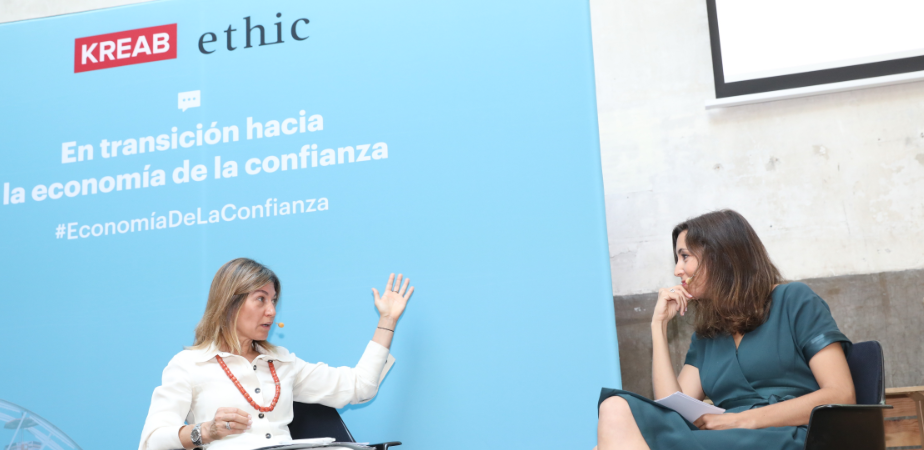
28/06/2019
Transparency and company experts call for a “circle of confidence” that paves the way for the fulfilment of the Sustainable Development Goals (SDGs)
Madrid, June 25, 2019
Federico Buyolo, head of the Spanish High Commission for the fulfilment of the Sustainable Development Goals, has in Madrid this Tuesday called for the ethical dimension of the so-called 2030 Agenda. “We cannot understand it, if it isn’t like an ethical agenda, it is not just an agenda of actions but an agenda of values”, he advocated during the “In transition towards the economy of trust” day, organised in Madrid by Kreab, an international communication and public affairs consultancy founded in Sweden in 1970, and Ethic, a reference magazine on ethics and sustainable development for Spain and Latin America.
In this context, Buyolo has defended that the key message of the so-called Sustainable Development Goals (SDGs) is the generation of an alliance ecosystem in which the actions of companies and public administrations come together to fulfil the established United Nations’ global objectives in the fight against poverty, development and the environment. For his part, Borja Bergareche, director of Kreab Digital, formulated as a “planetary” challenge the need to generate trust relationships between politicians and parties, between politics and business and, above all, between generations.
“This is what he is calling for, without a vote yet, but with a powerful voice, which we can qualify as a Greta generation,” Bergareche said, referring to Greta Thurnberg, the Swedish student promoting the “Friday of the Planet” movement.
The day was divided into two discussion tables aimed at positioning trust and dialogue as the basis for empowering the different actors involved in the trust economy generation, according to the slogan chosen by the organisers of the event, Kreab consultancy and Ethic magazine (full agenda of the day here).
How to build relationships of trust through transparency
In a dialogue between María Rubiños, Director of Reputation and Intangibles of Kreab, and Silvina Bacigalupo, President of International Transparency Spain, the need to position transparency as the axis of any discourse was highlighted.
For the President of International Transparency, an organisation founded in Berlin in 1993 with a focus on the fight against corruption, the entity’s focus today continues to be the promotion of public policies that are aimed at correct accountability. According to Bacigalupo, Professor of Criminal Law at the Autonomous University of Madrid, “we must explain how we are managing the interests of others.” “To date, the most effective way to promote these changes is through regulatory systems: some with milder consequences, others with serious penalties,” she said. “In this area of transparency, we have incorporated the concept, we have generated standards in many countries … but we have not changed the culture. The citizen, when he gets up in the morning, does not think about transparency and this requires education.”
For María Rubiños, director of the Reputation area of the Swedish consultancy Kreab: “In Sweden, this cultural change is already under way and there is a “social sanction” in which public opinion has a high level of demand for the accountability of companies and administrations towards citizens”.
The table ended with a brilliant intervention by Silvina Bacigalupo who, faced with a lack of awareness of the collective, sees in the so-called 2030 Agenda an excellent mechanism to try to generate culture and work on education and awareness.
Dialogue and active listening: managing expectations
At the table moderated by Laura Zamarriego, Chief Editor of Ethic, several aspects related to active listening in different organisations were discussed.
Thus, for Begoña de Benito Director of External Relations and CSR of Ecoembes, “we must try lead the way for companies, administration and citizens through collaborative work”. According to De Benito, the basis of trust is the knowledge and sharing of information.
Borja Lafuente, Head of Sustainability Iberia of Danone has highlighted how the active listening of consumers has been key in the company’s recently celebrated 100 years. “The key to transparency is to open up our company as a value to create social justice”, said Lafuente who gave Danone as an example, when they ceded their own strains for scientific purposes in order to share the legacy to benefit all and collaborate with the food system that faces a series of unprecedented challenges.
Juana López, UCLG Open Government Practice Community Coordinator and Associate Professor UCM, also spoke at the table. In her point of view, open government is composed of three key elements: transparency understood as accountability, active citizen participation and co-participation in the management of the public. All this in an environment that technologically facilitates access to information. Juana López has highlighted the need to establish enticement mechanisms to connect with citizens.
The table on dialogue and trust was closed by Julio Montes, co-founder of Maldita, who has defended the role of the media: “We have to recover the need for people to see the media as an anchor to turn to for truthful information”. For Montes “the concept of community helps build trust”.
